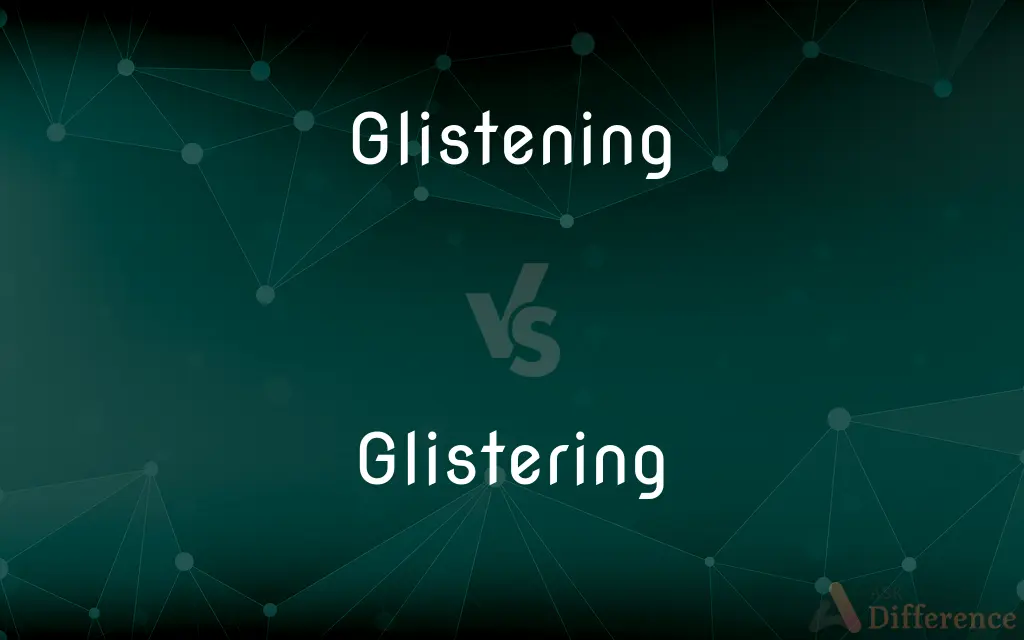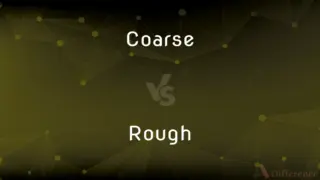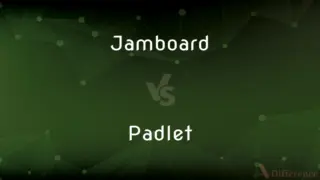Glistening vs. Glistering — What's the Difference?
By Maham Liaqat & Fiza Rafique — Updated on April 20, 2024
Glistening refers to shining with a soft, reflected light, often suggesting wetness, while glistering is less commonly used and implies a sparkling or shimmering effect.

Difference Between Glistening and Glistering
Table of Contents
ADVERTISEMENT
Key Differences
Glistening typically conveys the idea of a surface reflecting light smoothly and often subtly, suggesting moisture or a slick surface. For instance, one might describe dew-covered grass as glistening in the morning sun. On the other hand, glistering, although similar in meaning, tends to emphasize a more sparkling or shimmering quality. It often suggests a multitude of small, bright reflections, like stars glistering in the night sky.
Glistening is more commonly used in everyday language and literature, associated with a gentle or refined kind of shine. It is often used to enhance descriptions of natural scenes or objects that reflect light in a pleasing, understated way. Whereas glistering is less frequent in modern usage and carries a slightly more poetic or archaic tone, making it a favorite in literary contexts for its antique quality.
The verb glistening is derived from the Old English 'glisnian,' which means to glitter or shine, aligning with its current usage that often involves a wet or polished look. In contrast, glistering comes from the Middle English 'glisteren,' a variant of 'glisten,' and it retains a closer association with glittering or sparkling intensely.
In terms of phonetic appeal, glistening has a softer sound, which may contribute to its preference for describing delicate or subtle shines. On the other hand, the harder 't' sound in glistering might influence its use to describe more intense or vivid sparkling effects.
Both glistening and glistering enrich descriptive language, but choosing between them depends on the nuance a writer wants to convey. Glistening is suited for gentle, reflective surfaces like eyes or calm waters, while glistering fits better with descriptions needing a touch of grandeur or brilliance, such as gem-studded jewelry or a starry sky.
ADVERTISEMENT
Comparison Chart
Common Usage
More common, everyday use
Less common, slightly archaic
Implication
Soft, reflective light, often suggests wetness
Sparkling, shimmering light
Origin
Old English 'glisnian'
Middle English 'glisteren'
Phonetic Appeal
Softer sound
Harder 't' sound, more intense
Suitable Descriptive Context
Natural scenes, subtle reflections
Intense brilliance, poetic contexts
Compare with Definitions
Glistening
Appearing luminous or radiant.
His eyes were glistening with joy.
Glistering
Appearing brightly reflective.
The icy path was glistering dangerously.
Glistening
Having a sparkling appearance.
The freshly cleaned floor was glistening.
Glistering
Having a glittery, eye-catching appearance.
Her sequined dress was glistering at the party.
Glistening
Shining with a soft, often moist light.
The leaves were glistening with morning dew.
Glistering
Emitting a multitude of small, bright flashes.
The stars were glistering in the clear night sky.
Glistening
Emitting a soft, subdued light.
The snow was glistening under the street lamps.
Glistering
Shimmering with a radiant light.
The waves were glistering in the sunset.
Glistening
Reflecting light gently and with a sheen.
Her hair was glistening in the moonlight.)
Glistering
Sparkling or shining with a brilliant light.
The diamond ring was glistering under the showcase lights.
Glistening
To shine by reflection with a sparkling luster
"Sweat ... trickled in streams down his face and glistened in his beard" (Lois Lowry).
Glistering
To glisten.
Glistening
To be reflected with a sparkling luster
"The sun glistened upon his hair" (Robert Louis Stevenson).
Glistering
Glitter; brilliance.
Glistening
A sparkling, lustrous shine.
Glistering
Glistening, glittering, gleaming, shining.
Glistening
Present participle of glisten
Glistering
Present participle of glister
Glistening
The appearance of something that glistens.
Glistering
Having brief brilliant points or flashes of light;
Bugle beads all aglitter
Glinting eyes
Glinting water
His glittering eyes were cold and malevolent
Shop window full of glittering Christmas trees
Glittery costume jewelry
Scintillant mica
The scintillating stars
A dress with sparkly sequins
`glistering' is an archaic term
Glistening
(optics) A fluid-filled microvacuole within a lens.
Glistening
Reflecting light readily or in large amounts; having a surface luster; reflecting light directly rather than scattering it.
Glistening
Reflecting light;
Glistening bodies of swimmers
The horse's glossy coat
Lustrous auburn hair
Saw the moon like a shiny dime on a deep blue velvet carpet
Shining white enamel
Common Curiosities
Can glistening and glistering be used interchangeably?
While similar, they are not exactly interchangeable as glistening suggests a softer shine and glistering implies a more sparkling effect.
What kind of literary works prefer the use of glistering?
Works that evoke an old-fashioned or elaborate tone often prefer glistering.
What type of scenes are typically described as glistening?
Scenes involving water, dew, eyes, or polished surfaces are often described as glistening.
What does the phonetic difference between glistening and glistering suggest about their use?
The softer sound of glistening suggests gentleness, suitable for subtle effects, whereas the harder sound of glistering suits more vivid descriptions.
Is glistering commonly used today?
Glistering is less commonly used today and can have a slightly archaic or poetic connotation.
How does the origin of glistening and glistering affect their meanings?
Their origins reflect their meanings; glistening is associated with a smooth, shiny appearance, and glistering with sparkling or glittering.
In what contexts would glistening be a better choice than glistering?
Glistening is better for descriptions where a gentle, reflective quality is desired.
What does glistening imply in description?
Glistening often implies a soft, reflective shine, typically associated with wetness or a smooth surface.
What impact does the usage of glistening have in poetry?
In poetry, glistening can create an atmosphere of intimacy and quiet beauty.
How does the meaning of glistening relate to moisture?
Glistening often implies a connection to moisture, reflecting light off wet surfaces.
What literary effect does glistering achieve?
Glistering often adds a touch of brilliance or grandeur, making it suitable for poetic or dramatic contexts.
How do the examples provided illustrate the differences between glistening and glistering?
The examples highlight how glistening is used to describe softer, more natural shines, while glistering is used for more intense and brilliant reflections.
What are typical examples of objects that can be described as glistering?
Objects like diamonds, stars, and metallic surfaces are often described as glistering.
Why might an author choose glistening over glistering in a narrative?
An author might choose glistening to evoke a subtle, serene imagery, suitable for softer scenes.
Does glistering carry a connotation of value or luxury?
Yes, glistering can convey a sense of luxury or high value, especially when describing jewels or ornate items.
Share Your Discovery

Previous Comparison
Coarse vs. Rough
Next Comparison
Jamboard vs. PadletAuthor Spotlight
Written by
Maham LiaqatCo-written by
Fiza RafiqueFiza Rafique is a skilled content writer at AskDifference.com, where she meticulously refines and enhances written pieces. Drawing from her vast editorial expertise, Fiza ensures clarity, accuracy, and precision in every article. Passionate about language, she continually seeks to elevate the quality of content for readers worldwide.
















































